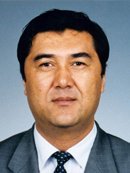Nur (or Nuer) Bekri 努尔白克力
Deputy, Ntnl Dev/Reform Commission
1961
Viewed as a sixth generation rising star, who may be in a leadership role in the future.

Overview
Pronunciation: Noor Beck-ree Nur Bekri
Born: 1961 in Xinjiang. Of Uighur nationality.
Education: Political Theory at the Central Party School 1986 – 1989.
Career: Early career in Xinjiang, apart from studies at Central Party School and short stint as Deputy Mayor of Feiching Shandong, prior to 2015. Formerly Mayor of Urumqi and Governor of Xinjiang. Held the Party line on the turmoil in Xinjiang in 2009. Member of the 18th CPC Central Committee. In 2015 moved to Beijing as Deputy Director of National Development and Reform Commission and Director of National Energy Administration.
Prospects: 6th generation star, possibly at the top of the Party in 2022.
Relevance to Tibet: No direct relevance, but may be one of China’s most senior leaders in the future.
Standing in the Party and Career Highlights:
This is a “mini” profile. See information in the Overview box, above right.
Nur Bekri’s Contact Information:
- Address: National Development and Reform Commission, No.38 Yuetan Nanjie, Xicheng District, Beijing 100824
- Website: www.bgt.ndrc.gov.cn/
- Phone:
- Fax:
Background information about Sixth Generation Leaders:
“Sixth generation” leaders were, in theory, due to reach the top in 2022, when the leaders who took office in 2012 have served two five-year terms. [Xi Jinping and Li Keqiang are fifth generation; Mao Zedong was first generation.] However, with Xi Jinping’s removal of the two-term limit, there is no telling when – or if – this generation will get its chance to lead.
Born in the 1960s, a number of sixth generation officials have been named by China commentators in recent years as having serious leadership prospects. They include: Hu Chunhua, Zhou Qiang, Nur Bekri, Lu Hao, Chen Min’er, Zhang Qingwei and Zhang Guoqing. Names that were previously on this list but have suffered political downfall are Sun Zhengcai and Su Shilin.
The tradition of former leaders selecting their successor’s successor – which applied to Deng Xiaoping (choosing Hu Jintao) and Jiang Zemin (choosing Xi himself) – would appear to be in serious doubt. Kerry Brown, writing in the Diplomat in December 2014 observed: “The idea of Xi Jinping’s predecessor Hu Jintao having much say in [the choice of next leader] seems to grow more remote with each passing day, as Xi appears more and more dominant. It goes against political, let alone psychological, logic to think that Xi might, for mere form’s sake, bow to Hu in his choice.”
A general summary of this age group by Melinda Liu, Newsweek, October, 2007:
Melinda Liu, writing in Newsweek in October, 2007, said: The ’60s Generation, as they’re also known, are seen as worldlier, more traveled and less doctrinaire than any previous Chinese generation….. the Gen-Sixers are less ideological and more market-savvy; their peers include private-sector millionaires and environmental activists. But they’re also apt to be nationalistic, even arrogant, some analysts say. “They lack the humility of [their elders],” says Cheng Li, a Sinologist at the Brookings Institution in Washington. “Some of them are quite spoiled, in my view.”
Printing this Page
For best results when printing this page, adjust your print settings by unchecking “print background colours” and “print background images”.
